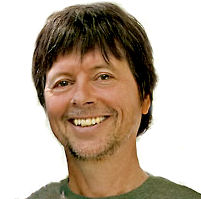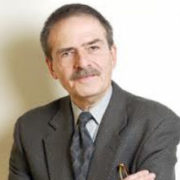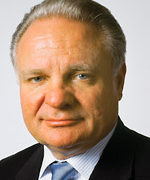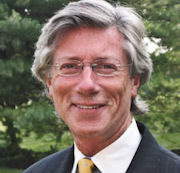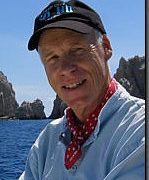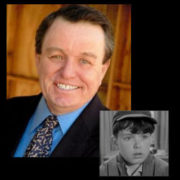Ken Burns
One of the most recognizable and popular documentary filmmakers of our time, Ken Burns chronicles those aspects of U.S. history that make us uniquely American. A perennial figure on PBS, Burns is the creator, director and producer of numerous award-winning documentaries, including Jazz, Civil War, Baseball, The National Parks: America’s Best Idea and The Tenth Inning. His most recent documentary, Prohibition, tells the story of the rise, rule, and fall of the Eighteenth Amendment to the U.S. Constitution and the entire era it encompassed.
Burns has also focused his lens a number of other topics, including: The War, an intimate look at the years 1941-1945; Not For Ourselves Alone: The Story of Elizabeth Cady Stanton and Susan B. Anthony, which tells the story of the two women who almost single-handedly created and spearheaded the women’s rights movement in America;Frank Lloyd Wright, the story of America’s foremost architectural genius; and Lewis and Clark: The Journey of the Corps of Discovery, which chronicles the first official expedition into uncharted spaces in United States history. Burns was co-producer of Mark Twain, a four-hour portrait of one of America’s funniest and most popular writers. A compelling storyteller, Burns speaks on these topics as well as the creative process.
An eloquent keynote speaker, Ken Burns always address what we share in common, not what divides us. He discusses his famous trilogy of celebrated documentary films and reveals the leadership models in the unexpectedly dramatic story of Lewis and Clark, delves into the complete and often contradictory lives of great American figures including Thomas Jefferson,Frank Lloyd Wright, and Mark Twain, and celebrates the achievements of the common soldier in The War.
“There is too much ‘pluribus’ these days,” Ken Burns says, “and not enough ‘unum.’ I’m in the business of ‘unum’.” He does this in his films, of course, but also in his equally acclaimed and riveting speeches before business and community audiences. Great oratory has all but disappeared from our public discourse, so it is indeed refreshing to have Burns remind us…words matter.
PROGRAM TOPICS
The National Parks – A Treasure House of Nature’s Superlatives
Burns discusses, in this unusually moving and personal lecture, the great gift of our national parks. Here both “the immensity and the intimacy of time” merge, as we appreciate what the parks have added to our collective and individual spirit. He begins the talk with a 13-minute clip – the intro to The National Parks: America’s Best Idea.
Sharing the American Experience
Ken Burns reminds the audience of the timeless lessons of history, and the enduring greatness and importance of the United States in the course of human events. Incorporating The Civil War, Baseball and Jazz, Burns engages and celebrates what we share in common. No clips utilized in this presentation.
No Ordinary Lives
Drawing on some of Lincoln’s most stirring words as inspiration, this speech engages the paradox of war by following the powerful themes in two of Ken Burns’ best known works – The Civil War, his epic retelling of the most important event in American history and The War, his intensely moving story of WWII told through the experiences of so-called ordinary people from four geographically distributed American towns. The presentation opens with Norah Jones’ “American Anthem” clip (5 min) from The War.
American Lives
This presentation combines the biographies of some of Burns’ most fascinating subjects, including Thomas Jefferson, Lewis & Clark and Frank Lloyd Wright. He shares how biography works providing insight into the storytelling process.
Race in America
For more than 30 years, Burns has been dealing with the theme of race in his uniquely American documentaries. Now, in the age of Obama, he looks back from the perspective of monumental change in the country to reflect where we’ve been. He uses several clips from earlier films in this presentation.
Prohibition
In this presentation, Burns takes audiences through the compelling saga of Prohibition’s rise and fall that goes far beyond the oft-told tales of gangsters, rum runners, flappers, and speakeasies, to reveal a complicated and divided nation in the throes of momentous transformation. He discusses with audiences the vital questions raised by this era and the 18th Amendment which are as relevant today as they were 100 years ago – about means and ends, individual rights and responsibilities, the proper role of government and finally, who is — and who is not — a real American.
Conversation with Ken Burns
This is a less formal, conversational type of event. Burns’ addesses questions on all his films, issues in history and contemporary American culture.
On-Stage Q&A
This is a less formal, Inside-the-Actors-Studio type of event. Ken responds to questions on all his films and issues in history and contemporary American culture.
Full Biography
Ken Burns has been making films for more than thirty years. Since the Academy Award nominated Brooklyn Bridge in 1981, Ken has gone on to direct and produce some of the most acclaimed historical documentaries ever made.
A December 2002 poll conducted by Real Screen Magazine listed The Civil War as second only to Robert Flaherty’s Nanook of the North as the “most influential documentary of all time,” and named Ken Burns and Robert Flaherty as the “most influential documentary makers” of all time.
In March, 2009, David Zurawik of The Baltimore Sun said, “… Burns is not only the greatest documentarian of the day, but also the most influential filmmaker period. That includes feature filmmakers like George Lucas and Steven Spielberg. I say that because Burns not only turned millions of persons onto history with his films, he showed us a new way of looking at our collective past and ourselves.” The late historian Stephen Ambrose said of his films, “More Americans get their history from Ken Burns than any other source.”
Ken’s films have won twelve Emmy Awards and two Oscar nominations, and in September of 2008, at the News & Documentary Emmy Awards, Ken was honored by the Academy of Television Arts & Sciences with a Lifetime Achievement Award.
Ken has been the recipient of more than twenty-five honorary degrees and has delivered many treasured commencement addresses. He is a sought after public speaker, appearing at colleges, civic organizations and business groups throughout the country.
Projects currently in production include films on the Dust Bowl, the Central Park Jogger case, the Roosevelts, Jackie Robinson, the Vietnam War and country music.
In October of 2011 PBS broadcast Prohibition, a 3-part, 5 1/2-hour series directed by Ken and Lynn Novick. The film tells the story of the rise, rule and fall of the Eighteenth Amendment to the U.S. Constitution and the entire era it encompassed, a compelling saga that goes far beyond the oft-told tales of gangsters, rum runners, flappers and speakeasies, revealing a complicated and divided nation in the throes of momentous transformation. Prohibition raises vital questions that are as relevant today as they were 100 years ago – about means and ends, individual rights and responsibilities, the proper role of government, and, finally, who is – and who is not – a real American.
An update to the 1994 epic Baseball, The Tenth Inning was co-directed by Ken and Lynn Novick. David McMahon, Lynn Novick and Ken wrote and produced the film, which aired on PBS in September 2010. This two-part, four-hour documentary highlights the many dramatic developments that transformed the game: the crippling 1994 strike, the increasing dominance of Latin and Asian players; the rise of a new Yankee Dynasty, the historic World Series victory by the Red Sox, and the revelations about performance-enhancing drugs, a reality that cast a pall on some of the greatest stars of the game.
In the fall of 2009, PBS broadcast The National Parks: America’s Best Idea. Directed and co-produced by Ken, it was co-produced by his long-time collaborator Dayton Duncan. The six-part series focuses on the ideas and individuals that helped propel the parks into existence. Filmed over the course of more than six years at some of nature’s most spectacular locales – from Acadia to Yosemite, Yellowstone to the Grand Canyon, the Everglades of Florida to the Gates of the Arctic in Alaska – the heart of the story is nonetheless a story of people from every conceivable background – rich and poor; famous and unknown; soldiers and scientists; natives and newcomers; idealists, artists and entrepreneurs; people who were willing to devote themselves to saving some precious portion of the land they loved, and in doing so reminded their fellow citizens of the full meaning of democracy. The film won Emmy Awards for Outstanding Nonfiction Series and Outstanding Writing for Nonfiction Programming, as well as the 2010 CINE Golden Eagle Award.
In September 2007, PBS broadcast The War, which Ken co-produced and co-directed with long-time colleague, Lynn Novick. This seven-part film tells the story of the Second World War through the personal accounts of nearly 40 men and women from four quintessentially American towns. The series explores the most intimate human dimensions of the greatest cataclysm in history – a worldwide catastrophe that touched the lives of every family on every street in every town in America. The War was named an official selection at the 2007 Cannes Film Festival and won three Primetime Emmy Awards: Outstanding Writing for Nonfiction Programming, Outstanding Sound Editing for Nonfiction Programming, and Outstanding Voice-over Performance.
In January of 2005, Unforgivable Blackness: The Rise and Fall of Jack Johnson, a two-part film on the life of the first African-American heavyweight boxing champion, aired on PBS. It was produced with Ken’s long-time collaborator and editor Paul Barnes, and had its premiere at the 2004 Telluride Film Festival. This film won three Primetime Emmy Awards: Outstanding Nonfiction Special, Outstanding Writing for Nonfiction, and Outstanding Voice-over Performance.
Horatio’s Drive: America’s First Road Trip, an account of the first cross-country trip by automobile, was co-produced with Ken’s long-time colleague Dayton Duncan. This film aired on PBS in October of 2003, and was screened that same year at the Telluride Film Festival. The film earned the 2003 CINE Golden Eagle Award and, in 2004, the Christopher Award. David Bianculli of the New York Daily News said, “This is one drive on which no passenger will be asking impatiently, ‘Are we there yet?’ The journey, in this case, is the destination.” Mark Sachs of the Los Angeles Times wrote, “The detail work by Burns and Duncan offers such an authentic-feeling trip back in time that it’s as if viewers have a backseat perch as Jackson puts his cherry-red Winton touring car in gear and heads east.”
Mark Twain, a two-part, four-hour portrait of America’s funniest and most popular writer, was also co-produced with Dayton Duncan. Winner of the Leon Award for Best Documentary at the St. Louis Film Festival in 2001, the film aired on PBS in January 2002. Ken Ringle of The Washington Post wrote, ”Mark Twain is not only fascinating, funny, inspiring and wise, it’s one of the best primers on American literature and culture you could have.”
In January 2001, Jazz, the third in Ken’s trilogy of epic documentaries, which began with The Civil War and continued with Baseball, was broadcast on PBS. Co-produced with Lynn Novick, this 19-hour, ten-part film explores in detail the culture, politics and dreams that gave birth to jazz music, and follows this most American of art forms from its origins in blues and ragtime through swing, bebop and fusion.
Not For Ourselves Alone: The Story of Elizabeth Cady Stanton and Susan B. Anthony, winner of the prestigious Peabody Award and an Emmy Award, was co-produced with Paul Barnes and aired on PBS in November of 1999. This dual biography tells the story of the two women who almost single-handedly created and spearheaded the women’s rights movement in America, changing for the better the lives of a majority of American citizens. As Bob Herbert of The New York Times stated: “The latest splendid effort from..Ken Burns is about two women who barely register in the consciousness of late-20th century America, but whose lives were critically important to the freedoms most of us take for granted.”
In November 1997, Lewis and Clark: The Journey of the Corps of Discovery was released to critical acclaim and garnered the second-highest ratings in Public Television history. This four-hour film, co-produced with Dayton Duncan, chronicles the corps’ journey westward on the first official expedition into uncharted spaces in United States history.
Thomas Jefferson, a three-hour portrait of our third president, aired in February of 1997. This film explores the contradictions in the man who was revered as the author of the most sacred document in American history and condemned as a lifelong owner of slaves. Walter Goodman of The New York Times said: “…Thomas Jefferson is a considerable accomplishment, a thoughtful and affecting portrait of the intellectual who captured the essence of a new nation’s hopes in phrases that continue to resound around the world.” And George Will, in The Washington Post, said: “…Ken Burns presents a timely corrective, a visually sumptuous and intellectually judicious appraisal of Jefferson.”
In the fall of 1996, The West, an eight-part, 12 1/2 hour film series on the American west was released. The West is the story of one of the great crossroads in human history, a place where, tragically and heroically, the best of us met the worst of us and nothing was left unchanged. Ken Burns was executive producer and creative consultant for this highly praised series, directed by Stephen Ives, which won the 1997 Erik Barnouw Prize.
Ken Burns was the director, producer, co-writer, chief cinematographer, music director and executive producer of the Public Television series Baseball. Four and a half years in the making and eighteen and a half hours in length, this film covers the history of baseball from the 1840s to the present. Through the extensive use of archival photographs and newsreel footage, baseball as a mirror of our larger society was brought to the screen over nine nights during its premiere in September 1994. It became the most watched series in PBS history, attracting more than 45 million viewers.
Ken Burns was also the director, producer, co-writer, chief cinematographer, music director and executive producer of the landmark television series The Civil War. This film was the highest rated series in the history of American Public Television and attracted an audience of 40 million during its premiere in September 1990. The New York Times called it a masterpiece and said that Ken Burns “takes his place as the most accomplished documentary filmmaker of his generation
In 1981, Ken Burns produced and directed his first film for PBS, the Academy Award nominated Brooklyn Bridge. During the 1980s he made several other award-winning films, including The Shakers; Statue of Liberty, also nominated for an Oscar; Huey Long, the story of the turbulent southern dictator, which enjoyed a rare theatrical release; The Congress; Thomas Hart Benton, a portrait of the regionalist artist; and Empire of the Air: The Men Who Made Radio. Ken Burns has also produced and directed three films – William Segal, Vézelay, and In The Marketplace – which explore the questions of seeing, searching and being through the work and teachings of philosopher and painter William Segal.
Ken was born in Brooklyn, New York, in 1953. He graduated from Hampshire College in Amherst, Massachusetts, in 1975 and went on to be one of the co-founders of Florentine Films.
Expertise: BUSINESS | Celebrities / Media Personalities | Creativity | ENTERTAINMENT | Filmmakers | Historians | Journalists | MISCELLANEOUS | Patriotism

